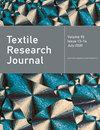Effects of fluorosilane addition on polyurethane electrospun membranes with waterproof and breathable performance
IF 1.9
4区 工程技术
Q2 MATERIALS SCIENCE, TEXTILES
引用次数: 0
Abstract
Waterproof and breathable fibrous membrane is a new type of polymer functional material widely used in outdoor protection, sports equipment, industrial production, and other fields. To impart waterproof ability and breathability, a common practice is to modify the electrospun membrane with low surface-energy materials, such as fluorosilane. However, when directly added to the electrospinning solution, the effects of fluorosilane on the property of the prepared membrane have been scarcely reported. Herein, we prepared the electrospun polyurethane membrane by adding two types of fluorosilane into the polyurethane solution. The effects of fluorosilane type and concentration on the conductivity and viscosity of the electrospinning solution were investigated. Moreover, the prepared polyurethane/fluorosilane fibrous membranes are analyzed in terms of their surface morphology, structure, water contact angle, breathable performance, and mechanical properties. Results show that the dual effects of fluorosilane content exert an opposing influence on the jet drawing process, which yields a minimum fiber diameter when the fluorosilane content is 20%. Under this condition, the membrane shows the highest water vapor transmission rate (10.4 kg/(m添加氟硅烷对具有防水透气性能的聚氨酯电纺丝膜的影响
防水透气纤维膜是一种新型高分子功能材料,广泛应用于户外防护、运动器材、工业生产等领域。为了增强防水透气性,通常的做法是用低表面能材料(如氟硅烷)对电纺丝膜进行改性。然而,将氟硅烷直接加入电纺丝溶液中,其对所制备膜性能的影响还鲜有报道。在此,我们在聚氨酯溶液中加入两种氟硅烷制备了电纺聚氨酯膜。研究了氟硅烷类型和浓度对电纺溶液电导率和粘度的影响。此外,还对制备的聚氨酯/氟硅烷纤维膜的表面形态、结构、水接触角、透气性能和机械性能进行了分析。结果表明,氟硅烷含量的双重效应对喷射拉丝过程产生了相反的影响,当氟硅烷含量为 20% 时,纤维直径最小。在此条件下,膜的水蒸气透过率最高(10.4 kg/(m2-d))。此外,当氟硅烷含量为 40% 时,膜的水接触角(138°)和断裂强度(12 兆帕)最大。这项研究为在户外运动和防护设备中制造电纺防水透气膜提供了启示。
本文章由计算机程序翻译,如有差异,请以英文原文为准。
求助全文
约1分钟内获得全文
求助全文
来源期刊

Textile Research Journal
工程技术-材料科学:纺织
CiteScore
4.00
自引率
21.70%
发文量
309
审稿时长
1.5 months
期刊介绍:
The Textile Research Journal is the leading peer reviewed Journal for textile research. It is devoted to the dissemination of fundamental, theoretical and applied scientific knowledge in materials, chemistry, manufacture and system sciences related to fibers, fibrous assemblies and textiles. The Journal serves authors and subscribers worldwide, and it is selective in accepting contributions on the basis of merit, novelty and originality.
 求助内容:
求助内容: 应助结果提醒方式:
应助结果提醒方式:


